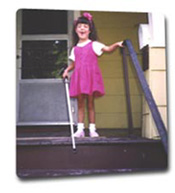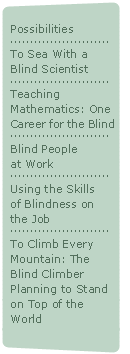|
 Possibilities Possibilities
by
Carol Castellano
Reprinted from March 1997 Braille Monitor
It
took my daughter Serena a long time to decide just what
she wanted to be when she grew up. Whereas my son was
only four when he decided that he would be a dinosaur
scientist, it wasn't until she was seven that Serena
realized that her destiny in life was to be a folksinger.
Happily she played the chords to her favorite song,
"Michael Row the Boat Ashore," on my guitar.
Then
came the Presidential campaign of 1992. Serena was eight.
She sat rapt before the television listening intently
to the speeches of both parties. After the summer's
two political conventions, she realized that it wasn't
a folksinger that she wanted to be after all...it was
a folksinging Senator. By late fall, having heard all
three Presidential debates, Serena was going to be President.
Her
barrage of questions about how she could learn to be
President and conversation about what politicians do
kept up for a long time. My husband and I were convinced
that our daughter might go into politics when she was
older.
In
the late spring of that year, Serena went out with her
father to pick early snow peas from the garden. Coming
inside with her basket of peas, she told me she was
very interested in gardening. "That's wonderful," I
replied. "You'll be a big help to Daddy."
Overnight
Serena's interest must really have taken root, because
the next day she asked me if I thought the gardens at
the White House were too big for the President to tend,
since the President is such a busy person. "Yes," I
replied. "I'm sure there's a staff of people who take
care of the White House gardens." "Well then, I won't
be a gardening President," she told me. "I'll just be
a gardener."

The
desire to be a gardener was still but a tender shoot
when Serena took a piano lesson—just a few weeks
after picking those peas—and realized it was a
pianist she wanted to be! After that, a great enthusiasm
for sports convinced her that radio sports announcing
was the career for her. Then, at twelve, with a maturing
understanding of people and events, Serena wanted to
become a counselor for children with difficulties.
For
Serena, childhood is a wonderful stage of life! Interested
in everything, trying everything out, she sees the world
as her plum, ripe for the picking. She believes in herself,
as we believe in her. And since what people believe
largely determines what they do, it is critically important
that parents of blind children—and other adults
in the child's life—have positive beliefs about
blindness and what blind people can do.
If
we are told (in a journal article or by a teacher of
the blind, say) that blind children usually do not or
cannot learn how to do a certain task, and if we come
to believe that, chances are we will not give our child
the experience or opportunity anyone would need in order
to do that task. And chances are the child won't learn
to do it. Imagine, though, if we—and our blind
children—were never told that they couldn't accomplish
a certain thing. Imagine what the results might be if
everyone believed that blind people could do anything
they wanted to!
Well,
I believe that and I think I have good reason for it.
Each year my husband and I attend the National Convention
of the National Federation of the Blind. There we have
met or have heard speak, a blind high school teacher,
college professor, mathematician, NASA scientist, chemist,
car body mechanic, industrial arts teacher, transmission
mechanic, Foreign Service officer, engineer, high-performance
engine builder, and a man who sailed solo in races from
San Francisco to Hawaii. Twice. And came in third.

These
blind men and women approach life's challenges with
a sense of excitement and creativity, asking not whether
they can accomplish the task but how they will do it.
Attendance at National Conventions and meeting blind
people from so many walks of life have enabled us to
see firsthand that blindness does not have to stop people
from achieving what they want to achieve and that belief
guides the way we bring up our daughter.
Sometimes
in the professional literature I read the phrase "accepting
the child's blindness." That word "acceptance" always
causes me some concern; different people can mean entirely
opposite things by the word "acceptance." To some, "accepting
the child's blindness" means accepting—or coming
to believe—that because the child is blind, there
will be limits to what the child can do, limits to what
he or she can understand, limits to what he or she can
learn. (They often refer to these beliefs as "being
realistic.") It is easy to see what the effects of that
kind of thinking will be.
When
I consider the term "accepting the child's blindness,"
I think about accepting that the child is blind, learning
and coming to believe that blindness need not stop the
child from achieving what he or she wishes, and allowing,
indeed insisting that the child learn the alternative
techniques of blindness that will enable him or her
to achieve the desired results!
Find
a way, parents and teachers. Keep all the doors open.
Glory in the exhilarating feeling of watching a child
look toward the future and see only possibilities.

|


 Possibilities
Possibilities